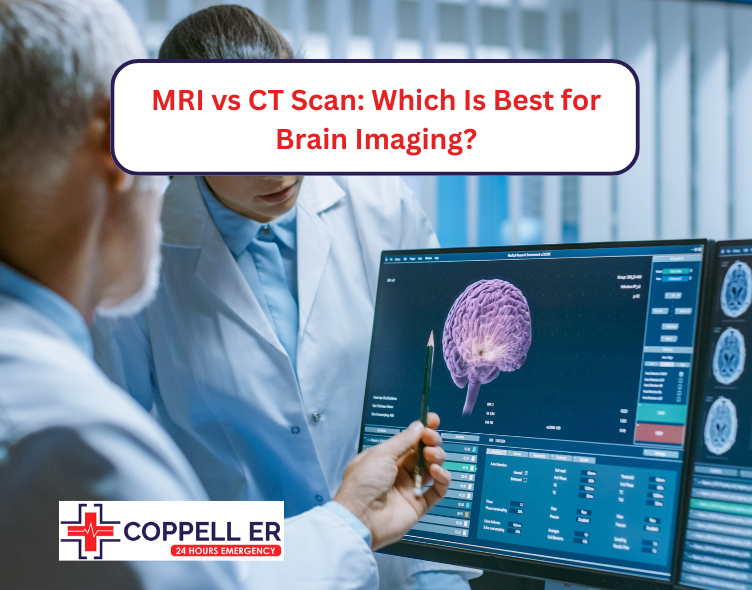Introduction
When it comes to diagnosing brain-related conditions, medical imaging plays a crucial role. Among the most commonly used techniques are brain CAT scan vs MRI. These advanced imaging technologies help doctors detect abnormalities, plan treatments, and monitor the progress of neurological conditions. Understanding the differences, benefits, and risks associated with each can guide patients in making informed decisions.
What is a Brain CAT Scan?
A Brain Computed Axial Tomography (CAT) scan, also known as a CT scan, uses X-ray technology combined with computer processing to create cross-sectional images of the brain. It provides quick, detailed information, making it essential in emergency situations.
How Brain CAT Scan Works
X-ray Beam: The machine rotates around the patient, emitting X-ray beams from different angles.
Image Capture: Detectors capture the X-rays after they pass through the body.
Image Processing: A computer compiles the data to create detailed cross-sectional images.
When is a Brain CAT Scan Recommended?
Head injuries
Brain hemorrhage
Skull fractures
Stroke
Brain swelling
Hydrocephalus
What is an MRI?
Magnetic Resonance Imaging (MRI) is a non-invasive imaging technique that uses powerful magnets, radio waves, and a computer to produce detailed images of the brain and other internal organs. Unlike X-rays or CAT scans, MRI does not use ionizing radiation, making it a safer option for repeated imaging.
How MRI Works
Magnetic Field: The MRI machine generates a strong magnetic field that aligns hydrogen atoms in the body.
Radio Waves: Pulses of radio waves are sent through the body, disrupting the alignment of these atoms.
Image Formation: As the atoms return to their original state, they emit signals that are captured and converted into detailed images.
When is MRI Recommended?
Stroke detection
Brain tumors
Multiple sclerosis
Aneurysms
Infections
Developmental anomalies
7 Key Differences Between Brain CAT Scan vs MRI
Aspect
Brain CAT Scan
MRI
Radiation
Yes
No
Imaging Detail
Moderate (bone and bleeding)
High (soft tissues)
Time Taken
5-10 minutes
30-60 minutes
Cost
Less expensive
More expensive
Use in Emergencies
Preferred
Less common
Contrast Agents
Iodine-based
Gadolinium-based
Safety Concerns
Radiation exposure
Metal implants, pacemakers
Benefits of Brain CAT Scan vs MRI
Benefits of Brain CAT Scan
Quick and efficient
Excellent for detecting acute bleeding and bone injuries
Widely available in emergency rooms
Benefits of MRI
High-resolution images
No radiation exposure
Better for detecting soft tissue anomalies
Risks and Precautions
Brain CAT Scan Risks
Exposure to ionizing radiation
Potential allergic reactions to contrast dye
Not recommended for pregnant women unless necessary
MRI Risks
Not suitable for patients with metal implants
Claustrophobia due to enclosed space
Possible allergic reaction to contrast dye
Preparing for Brain CAT Scan vs MRI
Preparation for Brain CAT Scan
Wear comfortable clothing
Inform the technician about allergies
Fasting if contrast dye is used
Preparation for MRI
Remove all metallic objects
Inform the technician about implants
Fasting if contrast dye is used
What to Expect During the Procedure
Brain CAT Scan Procedure
Lie on a table that slides into the scanner
Brief instructions to hold breath
Quick procedure, usually 5-10 minutes
MRI Procedure
Lie still on a sliding table
Earplugs or headphones to reduce noise
Takes 30-60 minutes
Post-Procedure Guidelines
Resume normal activities unless sedated
Drink plenty of water to flush out contrast dye
Follow up with your doctor for results
FAQs
1. Which is better, Brain CAT Scan or MRI?
It depends on the condition. Brain CAT Scan is preferred in emergencies, while MRI provides more detail for soft tissues.
2. Is Brain CAT Scan safer than MRI?
MRI is generally safer as it doesn’t involve ionizing radiation.
3. Can I eat before a Brain CAT Scan or MRI?
Yes, unless your doctor advises fasting for contrast use.
4. How long do Brain CAT Scan and MRI results take?
Results are usually available within 24-48 hours.
5. Can pregnant women undergo Brain CAT Scan or MRI?
MRI is safer during pregnancy, but Brain CAT Scans are avoided unless absolutely necessary.
For more blogs visit https://a4everyone.org/asthma-treatment-guidelines/


 :
: